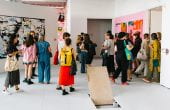This post was first published on the HEPI Blog on Monday 7 December 2020.

I have always firmly believed that responding to society’s most complex challenges requires a rounded, multidisciplinary approach.
Science and technology will play their vital role, but as we have seen throughout the COVID-19 crisis, context matters. To craft solutions that work, we need to examine their impacts from a human perspective – for example, how do we tackle misinformation around vaccines? What are the human rights and legal implications of lockdown restrictions and their enforcement?
The use of algorithms to determine the futures of a generation of school leavers in the summer is a prime example of where data alone can fall short. The system for GCSE and A-Level results led to an outcry, with the results of disadvantaged pupils most likely to be linked to the previous performance of their school. Despite the later move to centre-assessed grades, the damage for many young people had already been done.
To tackle any crisis, we need to understand where solutions will sit within the fabric of our society, layered over existing inequalities and received by communities and cultures seeing the world in different ways. Sarah Churchwell, Director of last month’s Being Human Festival, puts it perfectly: ‘The more chaotic the situation, the more we need deep context to interpret it for us.’ Science can’t go it alone.
At Goldsmiths, our focus is firmly on the human perspective across our varied disciplines. We centre creativity and human understanding in our approach to teaching and research, and through the commitments we make to addressing some of the most pressing challenges of our time.
One such challenge is the global climate emergency, one of the areas highlighted in December’s Sustainability Ambition in Education Week. As with COVID-19, spiralling climate and ecological breakdown look set to amplify existing inequalities in our society and any response demands close consideration of the many human impacts of this crisis.
The Green New Deal is our institutional response. The result of a campaign by Goldsmiths students and staff, the project commits us to the ambitious goal of carbon neutrality by 2025. While science and engineering solutions will be vital to get us there, we know our response must also centre people and how they will navigate this crisis.
This generation of students are the ones who will face the consequences of decades of inaction on climate change. We know that students want to learn about these issues, so we want to support them and future generations to tackle them through our teaching. Work on our curriculum will ensure all Goldsmiths students learn about climate change and environmental justice, including through new course options. The human consequences of climate change and ecological breakdown are wide-ranging and exacerbate existing inequalities – from the impacts of rising sea levels to the health of people living in polluted cities. It’s vital that our students go out into the world with knowledge of these problems and equipped to make a difference.
We also know that a range of health and wellbeing benefits come from spending more time engaging with the natural world – so we want to make our campus a place where students, staff and our local community can discover and enjoy its plants and wildlife, and resources like our campus allotment.
It’s never been clearer that to tackle the issues that matter we need expertise and ideas from across the spectrum of knowledge. Understanding the human experience will be key to making progress on the Grand Challenges now with us – and universities of all stripes must play their part.
Read more from HEPI here.




